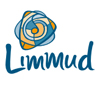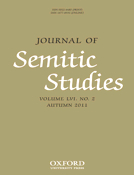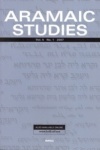New Publication
 Monday, April 30, 2012 at 12:14AM
Monday, April 30, 2012 at 12:14AM  Monday, April 30, 2012 at 12:14AM
Monday, April 30, 2012 at 12:14AM  Torah from Heaven. CJS honorary research fellow Rabbi Dr. Norman Solomon has published Torah from Heaven: The Reconstruction of Faith (2012). Traditional Jewish religious belief speaks of a divinely revealed, perfect text, authoritatively expounded. The question this book addresses is one with which the author has struggled all his life: in the light of historical criticism, advances in knowledge, and changing moral attitudes, is the traditional notion of divine revelation and authoritative interpretation still valid? Further information.
Torah from Heaven. CJS honorary research fellow Rabbi Dr. Norman Solomon has published Torah from Heaven: The Reconstruction of Faith (2012). Traditional Jewish religious belief speaks of a divinely revealed, perfect text, authoritatively expounded. The question this book addresses is one with which the author has struggled all his life: in the light of historical criticism, advances in knowledge, and changing moral attitudes, is the traditional notion of divine revelation and authoritative interpretation still valid? Further information.  Monday, April 30, 2012 at 12:14AM
Monday, April 30, 2012 at 12:14AM  Database Project presentation. Prof. Alex Samely, co-director of the CJS, gave a talk on the 'Database for the Analysis of Anonymous and Pseudepigraphic Jewish Literature of Antiquity' to the Biblical Studies Seminar of St Andrews University on 26 April. Further information.
Database Project presentation. Prof. Alex Samely, co-director of the CJS, gave a talk on the 'Database for the Analysis of Anonymous and Pseudepigraphic Jewish Literature of Antiquity' to the Biblical Studies Seminar of St Andrews University on 26 April. Further information.  Monday, April 30, 2012 at 12:11AM
Monday, April 30, 2012 at 12:11AM  Printed editions of the Manchester Journal of Jewish Studies. Melilah is the Centre's interdisciplinary journal and is now available not only as an electronic journal but also in book form, published by Gorgias Press. The journal is concerned with Jewish law, history, literature, religion, culture and thought in the ancient, medieval and modern eras. Back editions available in book form include vol. 6 (2009) and vol. 7 (2010), with vol. 5 (2008) to appear shortly. Further information.
Printed editions of the Manchester Journal of Jewish Studies. Melilah is the Centre's interdisciplinary journal and is now available not only as an electronic journal but also in book form, published by Gorgias Press. The journal is concerned with Jewish law, history, literature, religion, culture and thought in the ancient, medieval and modern eras. Back editions available in book form include vol. 6 (2009) and vol. 7 (2010), with vol. 5 (2008) to appear shortly. Further information.  Friday, April 27, 2012 at 6:18PM
Friday, April 27, 2012 at 6:18PM  Lecture: Jewish Views of Idolatry. Prof. Melissa Raphael-Levine (University of Gloucester) will speak on 'Jewish Views of Idolatry - and their Relevance to Contemporary Popular Culture'. Date: Thursday 3 May 2012 at 5.30 p.m. Venue: Lecture Theatre B of the World of Difference Lecture Block, Liverpool Hope University, Hope Park, Liverpool, L16 9JD (next to the Security Lodge, turning left on Taggart Avenue from the Woolton Road end). Tea will be available in the foyer outside the Lecture Theatre from 5.00 p.m. The lecture will be followed by a drinks reception.
Lecture: Jewish Views of Idolatry. Prof. Melissa Raphael-Levine (University of Gloucester) will speak on 'Jewish Views of Idolatry - and their Relevance to Contemporary Popular Culture'. Date: Thursday 3 May 2012 at 5.30 p.m. Venue: Lecture Theatre B of the World of Difference Lecture Block, Liverpool Hope University, Hope Park, Liverpool, L16 9JD (next to the Security Lodge, turning left on Taggart Avenue from the Woolton Road end). Tea will be available in the foyer outside the Lecture Theatre from 5.00 p.m. The lecture will be followed by a drinks reception. Friday, April 27, 2012 at 6:17PM
Friday, April 27, 2012 at 6:17PM  'Jewish identity in the 21st century'. CJS honorary research fellow, Dr. Yaakov Wise, will speak on the subject of 'Jewish Identity in the 21st Century' at the Manchester Mini-Limmud, Sunday 13 May, 5-8pm, Manchester Jewish Museum. Further information.
'Jewish identity in the 21st century'. CJS honorary research fellow, Dr. Yaakov Wise, will speak on the subject of 'Jewish Identity in the 21st Century' at the Manchester Mini-Limmud, Sunday 13 May, 5-8pm, Manchester Jewish Museum. Further information. Friday, April 27, 2012 at 6:16PM
Friday, April 27, 2012 at 6:16PM  Religious Symbolism and Discrimination: Academic and Faith Perspectives. On 25-26 May, CJS honorary research fellow Harry Lesser will be contributing to this two day workshop which, as part of the Arts-and-Humanities Research Council’s 'Connected Communities' programme, aims to reassess the relationship between religion and symbolism as this affects religious discrimination cases. In particular, it will examine the specific question of when, if ever, it should be permissible to discriminate against the wearing or exhibition of religious symbols. Venue: Foresight Centre, University of Liverpool. Further information.
Religious Symbolism and Discrimination: Academic and Faith Perspectives. On 25-26 May, CJS honorary research fellow Harry Lesser will be contributing to this two day workshop which, as part of the Arts-and-Humanities Research Council’s 'Connected Communities' programme, aims to reassess the relationship between religion and symbolism as this affects religious discrimination cases. In particular, it will examine the specific question of when, if ever, it should be permissible to discriminate against the wearing or exhibition of religious symbols. Venue: Foresight Centre, University of Liverpool. Further information. Friday, April 27, 2012 at 6:15PM
Friday, April 27, 2012 at 6:15PM  Living Memories of the Holocaust in Contemporary Society. Dr. Jean-Marc Dreyfus, Reader in Holocaust Studies, will present a paper on 'The Place of Memory of the Holocaust in Historical Studies' at the Council of Europe international conference: Mémoires Vivantes de l’Holocauste dans la Société Contemporaine in Strasbourg, 1 June 2012.
Living Memories of the Holocaust in Contemporary Society. Dr. Jean-Marc Dreyfus, Reader in Holocaust Studies, will present a paper on 'The Place of Memory of the Holocaust in Historical Studies' at the Council of Europe international conference: Mémoires Vivantes de l’Holocauste dans la Société Contemporaine in Strasbourg, 1 June 2012. Friday, April 27, 2012 at 6:12PM
Friday, April 27, 2012 at 6:12PM  'Modern Jewish Identities'. Dr. Elliot Cohen, CJS honorary research fellow and Senior Lecturer in Psychology and Society at Leeds Metropolitan University, will give a lecture on 'Modern Jewish Identities' at the Institute of Jewish Studies at the University of Nanjing on 6 June 2012.
'Modern Jewish Identities'. Dr. Elliot Cohen, CJS honorary research fellow and Senior Lecturer in Psychology and Society at Leeds Metropolitan University, will give a lecture on 'Modern Jewish Identities' at the Institute of Jewish Studies at the University of Nanjing on 6 June 2012. Friday, April 27, 2012 at 6:11PM
Friday, April 27, 2012 at 6:11PM  Marriage and Divorce in the Hebrew Bible. Prof. Bernard Jackson published 'The ‘Institutions’ of Marriage and Divorce in the Hebrew Bible' in Journal of Semitic StudiesLVI/2 (2011), 221-251. Further information.
Marriage and Divorce in the Hebrew Bible. Prof. Bernard Jackson published 'The ‘Institutions’ of Marriage and Divorce in the Hebrew Bible' in Journal of Semitic StudiesLVI/2 (2011), 221-251. Further information. Friday, April 27, 2012 at 6:10PM
Friday, April 27, 2012 at 6:10PM  The 2013 Sherman lectures are to be given by one of the foremost experts in modern Israel Studies, Prof. Derek Penslar. He will shortly take up the University of Oxford's first Chair in Israel Studies. The dates are 11-14 March 2013 and further information will be published widely nearer the time.
The 2013 Sherman lectures are to be given by one of the foremost experts in modern Israel Studies, Prof. Derek Penslar. He will shortly take up the University of Oxford's first Chair in Israel Studies. The dates are 11-14 March 2013 and further information will be published widely nearer the time.
 Sunday, April 15, 2012 at 5:27AM
Sunday, April 15, 2012 at 5:27AM
 Thursday, March 29, 2012 at 8:53AM
Thursday, March 29, 2012 at 8:53AM  Great British Faith. On Tuesday 3 April [note change of date from Monday 2 April], 10pm CJS honorary research fellows Dr. Yaakov Wise and Bill Williams will feature in the new series of the popular Great British Faith on BBC Radio 2, in which Hardeep Singh Kohli journeys to three of the most exciting cities in the UK, London, Belfast and Manchester and, in doing so, tells the story of faith in Britain today. This edition focuses on the Jewish communities of Greater Manchester, their history, culture and observance.
Great British Faith. On Tuesday 3 April [note change of date from Monday 2 April], 10pm CJS honorary research fellows Dr. Yaakov Wise and Bill Williams will feature in the new series of the popular Great British Faith on BBC Radio 2, in which Hardeep Singh Kohli journeys to three of the most exciting cities in the UK, London, Belfast and Manchester and, in doing so, tells the story of faith in Britain today. This edition focuses on the Jewish communities of Greater Manchester, their history, culture and observance.
 Tuesday, March 27, 2012 at 12:31AM
Tuesday, March 27, 2012 at 12:31AM  You are cordially invited to attend the 2012 Sherman Lectures which are to be given by Prof. Philip Alexander, FBA, Emeritus Professor of Post-Biblical Jewish Literature at the University of Manchester, on The Messianic Idea in Judaism Revisited.
You are cordially invited to attend the 2012 Sherman Lectures which are to be given by Prof. Philip Alexander, FBA, Emeritus Professor of Post-Biblical Jewish Literature at the University of Manchester, on The Messianic Idea in Judaism Revisited.
The lectures will be held Mon 16 – Thu 19 April at 5:15pm each day, except for the final session on Thu 19 April when we will start at 4:15pm. The venue is A113 in the Samuel Alexander Building, University of Manchester, Oxford Road, M13 9PL (Building 67 on the Campus Map). If you would like to help publicise this event, please download the poster.
Series Abstract:
Messianism is integral to the theology of Judaism, and is one of the big ideas that Judaism has bequeathed to the world, influencing, as it has, profoundly, Christianity and, to a lesser degree, Islam. Much has been written on the subject, but much, I would argue, remains to be said. In this series of lectures I will attempt to draw together more than twenty years of thinking and writing on Jewish Messianism to present a systematic account of my ideas. I will offer a critical overview of previous scholarly work, discuss the problems of defining Messianism (a surprisingly tricky task), trace the history of Messianism within Judaism from earliest times to the present, and then offer a series of probes into three particular versions of the Messianic Idea – Messianism as a historical-political process, Messianism as a drama in the spiritual realm, and “neutralized” Messianism – all based on close reading of primary sources. I will then propose a descriptive, analytical grid which will attempt to capture comprehensively the structure and key motifs of Jewish Messianism, onto which any specific form of the phenomenon can be mapped, and its distinctive character, as opposed to other forms of Messianism, ascertained. I will conclude by offering, as a historian of Judaism, some reflections on the implications of my analysis for the future of Jewish theology and for Jewish-Christian dialogue.
Community Sherman Lecture (in association with the Zionist Central Council and the Jewish Representative Council): Messianism and Zionism
8pm Sun 15 April at a North Manchester Venue to be advised on booking. Tel: 0161 720 8721 by 12 April.
This talk will be a “taster” for my Sherman Lectures, “The Messianic Idea in Judaism Revisited”, to be delivered at the Centre for Jewish Studies of the University of Manchester, 16th-19th April. In it I will explore one aspect of the larger topic, namely the relationship between Messianism and Zionism. Both Messianism and Zionism have a long history within Judaism. I will trace the development of both ideas and explore how, over the centuries, they have converged and diverged. We will spend most of our time on the modern period, from the rise of modern political Zionism in the late 19th century onwards, and examine a variety of views which see Messianism and Zionism as irreconcilable, as compatible, and as more or less identical. We will conclude by considering the implications of using messianic language in political discourse in Israel.
 Tuesday, March 27, 2012 at 12:25AM
Tuesday, March 27, 2012 at 12:25AM  New Neighbours, New Opportunities: The Challenges of Multiculturalism and Social Responsibility. Registration is now open for the annual International Council of Christians and Jews’ (ICCJ) conference, 1-4 July 2012. This year’s event will take place in Manchester and has been organized in cooperation with the Centre for Jewish Studies at the University of Manchester, the UK Council of Christians and Jews and its local Manchester CCJ branch. Conference Programme, Theme and Workshops. You can register now at www.iccj.org.
New Neighbours, New Opportunities: The Challenges of Multiculturalism and Social Responsibility. Registration is now open for the annual International Council of Christians and Jews’ (ICCJ) conference, 1-4 July 2012. This year’s event will take place in Manchester and has been organized in cooperation with the Centre for Jewish Studies at the University of Manchester, the UK Council of Christians and Jews and its local Manchester CCJ branch. Conference Programme, Theme and Workshops. You can register now at www.iccj.org.
 Tuesday, March 27, 2012 at 12:19AM
Tuesday, March 27, 2012 at 12:19AM  How Jewish is Jewish Folklore?: The Nineteenth-Century Rise of Folklore Studies and the Claims of Jewish Cultural Authenticity. Dr Cathy Gelbin has contributed a chapter to Irene A. Diekmann et al (eds.) '...und handle mit Vernunft': Beiträge zur europäisch-jüdischen Beziehungsgeschichte (Hildesheim: Olms; 2012), 209-224. This article looks at Germany from the 1870s until World War I, when as part of a broader discourse on folk traditions and the nation Jewish folktales played an important role in defining the racial and cultural status of the Jews. As rising racial antisemitism scientifically redressed the old concept of the Jews’ essential difference, the proponents of “Wissenschaft des Judentums” (the Scientific Study of Judaism) studied Jewish folk traditions to promote the culturally productive nature of the Jewish diaspora for both Jews and non-Jews. Further information.
How Jewish is Jewish Folklore?: The Nineteenth-Century Rise of Folklore Studies and the Claims of Jewish Cultural Authenticity. Dr Cathy Gelbin has contributed a chapter to Irene A. Diekmann et al (eds.) '...und handle mit Vernunft': Beiträge zur europäisch-jüdischen Beziehungsgeschichte (Hildesheim: Olms; 2012), 209-224. This article looks at Germany from the 1870s until World War I, when as part of a broader discourse on folk traditions and the nation Jewish folktales played an important role in defining the racial and cultural status of the Jews. As rising racial antisemitism scientifically redressed the old concept of the Jews’ essential difference, the proponents of “Wissenschaft des Judentums” (the Scientific Study of Judaism) studied Jewish folk traditions to promote the culturally productive nature of the Jewish diaspora for both Jews and non-Jews. Further information.
 Tuesday, March 27, 2012 at 12:18AM
Tuesday, March 27, 2012 at 12:18AM  Restored 14th C Hebrew manuscript preserved by experts at the University of Manchester’s John Rylands library is ready to go on display at the Metropolitan Museum of Art in New York. The manuscript will be the centrepiece of the exhibition 'The Rylands Haggadah: Medieval Jewish Art in Context', which runs from 27 March to 30 September. It will be flown to the United States accompanied by Conservator Steve Mooney who has spent the last eight months securing the areas of pigment and gold leaf which had started to crack and flake. Further information and Video Interview.
Restored 14th C Hebrew manuscript preserved by experts at the University of Manchester’s John Rylands library is ready to go on display at the Metropolitan Museum of Art in New York. The manuscript will be the centrepiece of the exhibition 'The Rylands Haggadah: Medieval Jewish Art in Context', which runs from 27 March to 30 September. It will be flown to the United States accompanied by Conservator Steve Mooney who has spent the last eight months securing the areas of pigment and gold leaf which had started to crack and flake. Further information and Video Interview.
 Tuesday, March 27, 2012 at 12:15AM
Tuesday, March 27, 2012 at 12:15AM  Manchester Jewish Museum and Heritage trail. On 14 March Dr Jean-Marc Dreyfus organized two visits for the students from his second year course, ‘A history apart: Jews in Europe 19th-20th centuries’. They visited the Manchester Jewish Museum, learning about the history of the museum and the community that worshipped there, and took part in the Heritage Trail around the old Jewish quarter of Cheetham Hill, a walking tour led by local historian Merton Paul in which they visited sites of great importance to the people of the community, often refugees from Eastern Europe, and heard anecdotes about their lives.
Manchester Jewish Museum and Heritage trail. On 14 March Dr Jean-Marc Dreyfus organized two visits for the students from his second year course, ‘A history apart: Jews in Europe 19th-20th centuries’. They visited the Manchester Jewish Museum, learning about the history of the museum and the community that worshipped there, and took part in the Heritage Trail around the old Jewish quarter of Cheetham Hill, a walking tour led by local historian Merton Paul in which they visited sites of great importance to the people of the community, often refugees from Eastern Europe, and heard anecdotes about their lives.
 Tuesday, March 27, 2012 at 12:12AM
Tuesday, March 27, 2012 at 12:12AM  Taylor-Schechter Genizah Research Unit. On 14 March Dr Sophie Garside led a group of fifteen students from Religions and Theology and Middle Eastern Studies on an excursion to visit the Taylor-Schechter Genizah Research Unit at Cambridge. They were treated to a presentation of a selection of manuscripts and a talk by Dr Ben Outhwaite, Head of the Unit, and a further talk and display from our own Dr Renate Smithius about interesting manuscripts from the Cairo Genizah which are held in the John Rylands University Library, Manchester.
Taylor-Schechter Genizah Research Unit. On 14 March Dr Sophie Garside led a group of fifteen students from Religions and Theology and Middle Eastern Studies on an excursion to visit the Taylor-Schechter Genizah Research Unit at Cambridge. They were treated to a presentation of a selection of manuscripts and a talk by Dr Ben Outhwaite, Head of the Unit, and a further talk and display from our own Dr Renate Smithius about interesting manuscripts from the Cairo Genizah which are held in the John Rylands University Library, Manchester.
 Friday, February 24, 2012 at 7:57AM
Friday, February 24, 2012 at 7:57AM  Typology of Jewish Literature Project. A whole volume of the academic journal Aramaic Studies was recently devoted to the results of the Manchester-Durham Project led by Alex Samely on the literary structures of ancient Jewish texts. Aramaic Studies volume 9 (Autumn 2011) contains articles and analyses by Project team members Philip Alexander, Robert Hayward, Rocco Bernasconi and Alex Samely, and also presents to the scholarly world, for the first time in printed format, the key document arising from this four-year project: a systematic list of all key literary features that shape ancient Jewish literature. This list of literary features, called the "Inventory", occupies the final 50 pages of this 250 page volume. Further information.
Typology of Jewish Literature Project. A whole volume of the academic journal Aramaic Studies was recently devoted to the results of the Manchester-Durham Project led by Alex Samely on the literary structures of ancient Jewish texts. Aramaic Studies volume 9 (Autumn 2011) contains articles and analyses by Project team members Philip Alexander, Robert Hayward, Rocco Bernasconi and Alex Samely, and also presents to the scholarly world, for the first time in printed format, the key document arising from this four-year project: a systematic list of all key literary features that shape ancient Jewish literature. This list of literary features, called the "Inventory", occupies the final 50 pages of this 250 page volume. Further information.
 Saturday, February 18, 2012 at 1:38AM
Saturday, February 18, 2012 at 1:38AM  Am ha-aretz in the Mishnah. CJS honorary research fellow Dr. Rocco Bernasconi has published an article in the Revue des Études Juives which considers how the term am ha-aretz is used in the Mishnah. The purpose of the article is to show that despite the different meanings and interpretations connoted by the term throughout the Mishnah, it is possible to find a unifying element across its usages. Further information.
Am ha-aretz in the Mishnah. CJS honorary research fellow Dr. Rocco Bernasconi has published an article in the Revue des Études Juives which considers how the term am ha-aretz is used in the Mishnah. The purpose of the article is to show that despite the different meanings and interpretations connoted by the term throughout the Mishnah, it is possible to find a unifying element across its usages. Further information.
IMAGE CREDITS: Illumination from a 14th century Spanish Passover Haggadah, showing the Israelites walking through the Red Sea. © John Rylands University Library of Manchester.
CENTRE FOR JEWISH STUDIES, Department of Religions and Theology, University of Manchester, Oxford Road, Manchester, M13 9PL. Tel: +44 (0)161 2753614. Email: cjs@manchester.ac.uk Co-Directors: Prof. Daniel Langton, Prof Jean-Marc Dreyfus, and Prof. Alex Samely. If you wish to be kept informed of the Centre's activities and events, please subscribe to the emailing list.
